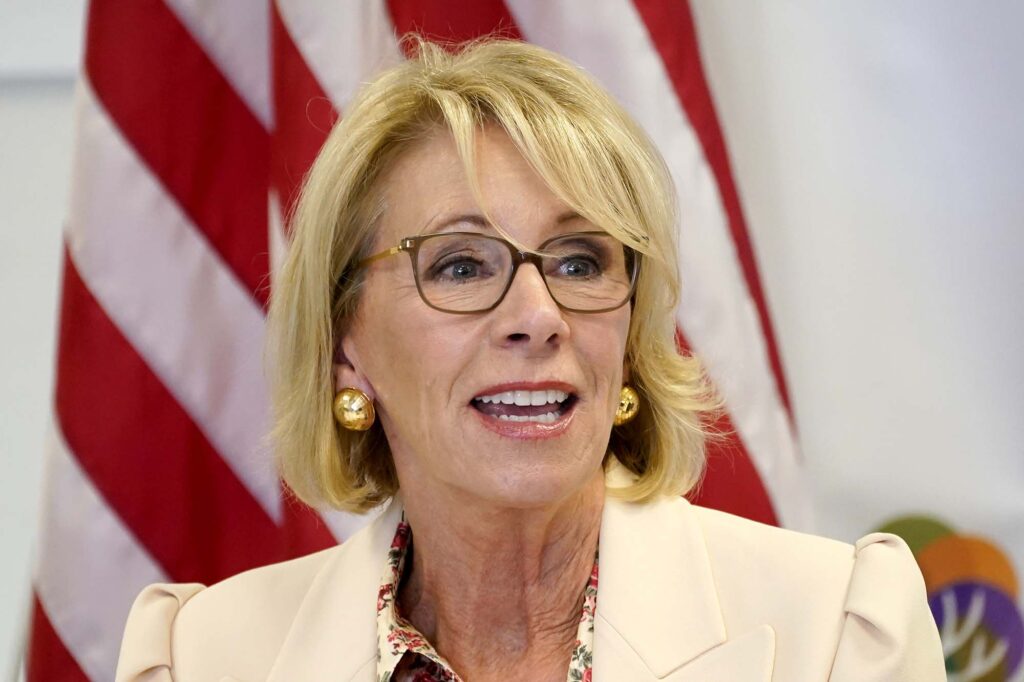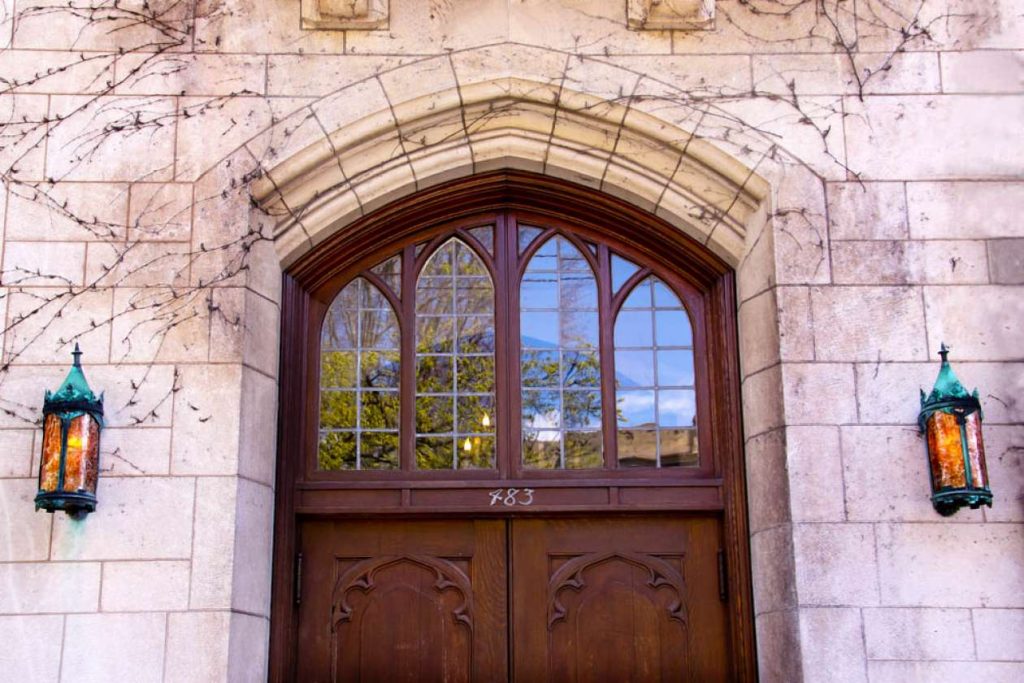Update: March 8, 1:45 p.m.: President Biden today signed an executive order calling for the Department of Education to review Title IX regulations amended by the Trump administration. The order could reverse policies criticized by victims of sexual assault on campus.
*Name changed to protect the identity of the student.
When Betsy DeVos took the helm at the Department of Education in 2017, she decried the way many colleges and universities were handling sexual-assault allegations. Too often, DeVos said, the accused were being denied due process. “Through intimidation and coercion, the failed system has clearly pushed schools to overreach,” she said in September of that year. “With the heavy hand of Washington tipping the balance of her scale, the sad reality is that Lady Justice is not blind on campuses today.”
DeVos resolved to fix the problem. By many accounts, however, she made things worse. Months after taking office, she rescinded a guidance document issued by the Obama administration in 2011 — a measure that heightened schools’ obligations to address alleged attacks. In its place, DeVos last year rolled out revised regulations for enforcing Title IX, the federal law prohibiting sex discrimination in federally funded education programs. The amendments narrowed the scope of incidents that required investigation, permitted cross-examination of students who file reports, and required a presumption of innocence for the accused.
President Joe Biden, who as vice president backed a grassroots effort to strengthen Title IX protections, has vowed to undo DeVos’ reforms. Adjustments around the edges are possible in the near future. But significant change will be neither easy nor quick.
In the meantime, victims must endure a process that is traumatic all on its own.
Unraveling Title IX protections
Under the 2011 guidance document, schools were not required to conduct hearings in cases of alleged assault, though they did have to make any opportunity to present evidence or witness statements available equally to either party. Instead, a trained investigator typically would collect testimony, gather other evidence and submit a finding to the school — which, some advocates for the accused say, gave too much power to a single person.
DeVos rescinded the Obama policy and, in its place, issued interim guidance that no longer discouraged cross examination of victims during hearings.
That was the type of process Hannah* endured after she said she was assaulted twice by another student in her first semester at Albion College in southern Michigan in 2018. She did not want to report the first attack — especially after the perpetrator allegedly threatened her life. But when he assaulted her again within a few weeks, she said, she felt compelled to have it on the record in case he tried to prey on someone else.
“I was scared I was going to be killed,” Hannah said of her decision not to seek a formal investigation. “I just wanted to have it on file.”
But school officials deemed her allegations too serious not to pursue.
Albion’s investigation began in September 2018 and culminated in a hearing two months later. At the hearing, held in a conference room, Hannah didn’t have to see the perpetrator’s face on the other side of a partition but could hear his voice.
“This is a voice who threatened to kill me,” she said. “It’s quite an experience.”
Hannah and her alleged assailant testified before a panel, then underwent cross-examination, with questions submitted in writing by each party and asked by a hearing officer. Hannah said the proceeding forced her to relive her trauma.
Hannah’s assailant was suspended for violating the school’s sexual assault policy, based on the documentation and oral evidence presented during the hearing. Despite the alleged threat to her life, the man was allowed to stay on campus and finish his final exams — while Hannah said she was encouraged to go home. Her appeal to have him expelled was denied, even though, according to Hannah, he warned her after the first attack that he had “almost killed someone before and I would do it again …. [He] looked at me directly after I said I would report. To me that’s very clearly a death threat. To campus safety that was clearly a death threat, to the hearing officers, I would assume that’s clearly a death threat.”
At the hearing, according to Hannah, the alleged assailant was asked: “‘Did you say that?’ And he said, ‘Yes.’ And they said, ‘Why?’ And he said, ‘I don’t know.’ And they did not feel the need to immediately remove him from campus.
“They gave him almost more of a right to his education than I had,” Hannah said. “I did not go home. I tried to get things done, but [being on campus] was so scary. And the fact that I have a strong GPA is honestly against all odds.”
Albion declined to comment on Hannah’s or any other specific case, saying it needs to protect student privacy, according to an emailed statement from Dr. Mathew Johnson, the college’s president.
“Know that we investigate all complaints concerning the conduct of campus community members in accordance with our policies,” Johnson wrote.
Regulating sexual assault investigations
One of the federal laws that govern how schools and colleges handle sexual assault is Title IX, a provision of the Education Amendments passed by Congress in 1972 to address the exclusion of women from educational programs.
The law was first applied to sexual harassment after a landmark lawsuit against Yale University in 1977, which set the precedent that schools could be held liable for failing to protect students. In 1981, the Department of Education listed sexual harassment as a form of discrimination under Title IX for the first time. In 1997, the department issued guidance that defined types of harassment, required schools to adopt and publish student complaint procedures and detailed how it would investigate complaints against schools.
In 2011, spurred in part by a Center for Public Integrity investigation, the department issued a “Dear colleague” letter to schools that aimed to address some of the issues the investigation brought to light: institutional barriers students faced when reporting incidents, gag orders that silenced them, and few consequences for the attackers. The department clarified the legal requirements in 2014. It said, for example, that schools should issue findings on student complaints based on a “preponderance of evidence” standard, meaning the likelihood that an assault or a case of harassment had occurred was more than 50 percent. The moves by the Obama administration drew praise from the National Women’s Law Center and 85 other organizations.
In 2017, however, DeVos set out to undo these reforms.
Citing concerns with due process — which, The Nation reported, were brought to the department’s attention by men’s rights groups — DeVos rescinded the 2011 letter and issued interim guidance that called on schools to “apply their rules in a manner that respects the legal rights of students and faculty.”
In November 2018, the Education Department published a draft of Title IX revisions that drew more than 124,000 public comments.
Some were supportive.
“I have personal experience as my son went through a hearing without being allowed to cross examine witnesses, have access to evidence, or have an attorney speak (he had an attorney present but the attorney wasn’t allowed to speak.),” one woman wrote. “Being accused and ‘tried’ for sexual misconduct is extremely serious and those who are accused need to be provided true due process.”
Lawyers who represent students accused of assault lauded some of the changes — ensuring that proper notification was given to alleged perpetrators before investigations, for example. And some faculty members found relief in no longer being obligated to launch an investigation if they were informed of or suspected an incident.
Others wrote to protest.
“There should be a fair process that protects the VICTIM and properly investigates the events in question,” wrote one commenter. “Go back & come up with something better than the recommended changes. They are no improvement.”
Criticism also poured in from officials at school systems including the University of California; survivor advocacy groups; reproductive justice organizations for Black and Latina women; and politicians including Sen. Kirsten Gillibrand, D-N.Y. Many feared the amendments would deter students from reporting assault.
For example, under the 2011 guidance, schools were required to investigate any incident that was “severe, pervasive or objectively offensive.” After the amendments, which took effect in August 2020, schools only had to investigate incidents that met all of those descriptions.
In a letter to the Education Department in September 2017, nearly 80 organizations and individuals decried what they called DeVos’ “dangerous effort to roll back, rather than improve, protections for all students” and accused her of using “cherry-picked anecdotes” to justify her rejection of the Obama policy.
“Her justification doesn’t hold up: each of her anecdotes involve problems that arose because schools did not follow the [Obama] Guidance – problems that could effectively be addressed by implementing, not scrapping, the Guidance,” the letter says.

The Lawyers’ Committee for Civil Rights Under Law was one of several groups concerned that direct cross-examination could discourage reporting by women and girls of color — groups that already tend to underreport but experience sexual assault at elevated rates.
“To create these drastic changes in the system that tip the balance not just in favor but heavily in favor of alleged perpetrators simply because a handful of perpetrators felt they were wrongly accused — that’s a terrible way of trying to patch a broken system,” David Hinojosa, director of the committee’s Educational Opportunities Project, said in an interview. “That’s where you have a minor cut and really a Band-Aid would suffice, but instead you treat it with traumatic care.”
The 2020 amendments addressing campus assault
Sandra, a student in a healthcare-focused vocational program at Santa Barbara City College who asked to only be identified by her first name, says she was sexually harassed by a classmate in October 2020, during her first semester.
Though the campus was closed because of the COVID-19 pandemic, the program required students to continue their clinical work at a hospital — and encouraged them to form study groups. She made plans to study with a male classmate.
“Normally, I’d want to study in the library or a coffee shop, but I accepted his offer to meet at his apartment because those places aren’t open right now,” she said. When she tried to leave, “he did a number of things that made it clear he was trying to initiate a sexual relationship, which I did not want, and he had no reason to think I did.”
Sandra reported the incident to her program director, who advised her to report it to the school’s Title IX office. She did so — only to be told the office couldn’t initiate an investigation since the harassment occurred off campus. She was redirected to the school’s misconduct office.
“They were trying to do the right thing by investigating the incident because it was no longer covered by Title IX,” she said. “But it was obvious that the student conduct procedures were not set up to appropriately investigate or address sexual misconduct.”
After the school’s misconduct office found the alleged perpetrator “not responsible,” according to Sandra, she reached out to Equal Rights Advocates, a San Francisco-based legal advocacy group. It helped her file an appeal, which was granted.A spokeswoman for Santa Barbara City College declined to say why the man was found not responsible. But Equal Rights Advocates says it has been working with the school to improve its investigative processes.The case is being re-investigated, and the man was transferred to a different clinical site, lawyers with the group said.
“I’m lucky that I have a very strong support system,” Sandra said. “But even with them, I had breaking points when I thought I might need to drop out of my program. Many people don’t have the support system that I have and they just end up being pushed out.” The college’s spokeswoman acknowledged that, because of the changes to law as well as court rulings in the state, schools’ Title IX offices in California are investigating fewer cases.
“All sexual harassment cases are evaluated by Title IX and supportive measures are offered,” the spokeswoman wrote in an email. “Title IX then collaborates with student conduct to ensure the matter continues to be addressed in a supportive, thorough, and procedurally balanced manner for both parties.”
Other students who alleged sexual harassment or assault on their campuses say the prospect of a court-like hearing process required by the 2020 amendments was so stressful that they considered dropping their cases. Five of them joined a lawsuit already underway against the Education Department and DeVos. That case, filed in 2019 by Equal Rights Advocates and three other groups, sought to undo the changes to the Obama guidance document.
“I think I would be doubted and harassed by the process itself just for reporting,” plaintiff Anne Doe said in a statement released by Equal Rights Advocates. “I can’t afford to risk my recovery and my ability to process what happened to me in a system I can’t trust and that wasn’t designed to protect me or believe me.”
Means of recourse
Students dissatisfied with schools’ handling of reports can follow one of two paths with the Education Department.
There’s the Clery Act, a 31-year-old federal law requiring educational institutions that receive federal funding to report crimes on or near campus, including sexual assault. The most prominent penalty — $4.5 million — was imposed on Michigan State University in 2019 for failing to address allegations of sexual abuse of more than 300 women and girls over more than two decades under the guise of medical care by Larry Nassar, a physician for the school and the U.S. Olympics women’s gymnastics team. Nassar was fired in 2016, convicted of both state and federal charges, and sentenced to more than 100 years in prison.
All told, at least $11.4 million in Clery Act fines have been imposed against 62 institutions over the past 10 years. For the most part, however, these fines are levied for technical violations, such as failure to report crime data. The law rarely offers a timely mechanism for students alleging their schools mishandled assault reports.
Students also can file complaints with the Education Department’s Office of Civil Rights. As of early February the office had 261 open investigations related to sexual violence, dating to 2011.
“I can’t afford to risk my recovery and my ability to process what happened to me in a system I can’t trust and that wasn’t designed to protect me or believe me.”
Anne Doe, plaintiff in a lawsuit against the Education Department and Betsy DeVos
In theory, a school found to have neglected its Title IX obligations can have federal funding taken away. But that’s never happened. Typically, the civil rights office reaches an agreement with the school requiring it to improve its investigative processes but takes no action beyond that.
Increasingly students dissatisfied with an institution’s handling of a sexual assault report have turned to the courts. Since 2014, more than 200 federal Title IX lawsuits have been filed — by those alleging sexual assault and accused perpetrators, who said they were being denied their right to an education.
Alia Reynolds, a student at the University of California Santa Barbara and former vice president of the campus group Students Against Sexual Assault, said that when students go through the Title IX process or report incidents to the police, the perpetrators are locked up only “once in a blue moon,” and are rarely punished by their schools.
“Even if the perpetrator was given a punishment, [victims] don’t feel like they got justice because the perpetrator never owns up to what was done,” Reynolds said.
Moving forward
Dismantling DeVos’ Title IX reforms won’t be easy. An executive order issued by the Trump administration means that Biden’s nominee for education secretary, Miguel Cardona, can’t simply issue a new guidance document on sexual assault.
Instead, the Education Department may need to start a new rulemaking process, unless DeVos’s amendments are struck down by a court after legal challenges. Either could take months, if not years.
“Our hope is that with the change in administration the law can return to doing what it was designed to do, which is to protect students from sex discrimination and help ensure their education is not disrupted by sexual assault,” said Brenda Star Adams, a lawyer with Equal Rights Advocates.
In the meantime, thousands of open Title IX cases may be adjudicated under the DeVos rule, Star Adams said. That means many victims could be subjected to the trauma Hannah had to bear.
Already thin at 104 pounds, she lost another 10 in the weeks leading up to her November 2018 hearing at Albion. “I couldn’t eat in the dining hall because I didn’t feel safe,” she said.
She managed to get a 3.8 GPA that semester. She joined the student assembly and advocated for enhanced campus-safety measures. Albion, for its part, received a $300,000 grant from the U.S. Department of Justice in 2019 to support students like Hannah.
“When you look at my case, I won in a way. He’s not here anymore; I am,” she said of her assailant. “However, what did I win other than the right not to be in class with a person who raped me?”
Sameea Kamal, formerly with the Center for Public Integrity, is a news desk editor at the Los Angeles Times. This story was made possible through an Investigative Reporters and Editors fellowship.
Clarification: March 4, 2:30 p.m.: This story has been updated to clarify details of the Obama administration’s 2011 guidance document on campus sexual assault investigations.



